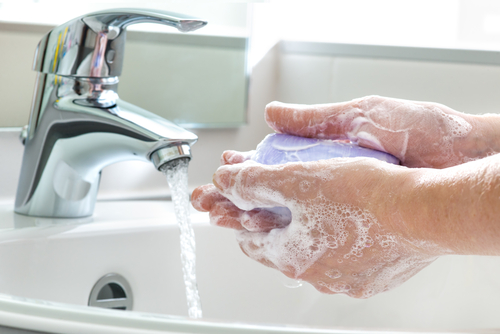
Photo: Shutterstock
A number of infectious diseases can be spread from one person to another by contaminated hands, especially gastrointestinal infections, influenza and hepatitis A. Ensuring that your hands are clean is one of the most important steps taken to avoid getting sick and spreading germs to others. Hand washing with lukewarm water and soap involves scrubbing that loosens up the dirt and microbes on our hands.
An online initiative called PRIMIT, designed by researchers at the University of Southampton, promotes frequent hand washing which curbs the risks of getting ill and spreading infections. A study, the findings of which were published in the medical journal “The Lancet”, involved about 16,000 households in the UK and was conducted during the winter, when the risk of flu is high.
It was found that the general risk of infection was 14 percent less with those who followed the initiative. Those participants also had a 20 percent less risk of catching the flu, saw their general practitioner less and required fewer antibiotics.
According to an article published on the website of the National Institutes of Health, MedlinePlus, Prof. Paul Little, from the University of Southampton, said in a journal news release, “A simple, cheap internet program to encourage hand washing can reduce the risk of infection by around 14 per cent. Because most of the population catches coughs, colds, sore throats and other respiratory infections, this could have an important impact on reducing the spread of these viruses in the general population, and also help reduce the pressure on health services during the winter months.”
Prof. Little says that individuals wash their hands about six times daily, but if that number could be increased to 10, it would have a major impact on restraining the spread of contagious disease and infection. This would be especially beneficial to those who have immunity issues or suffer from health problems.
The PRIMIT programme involved four weekly sessions that enlightened the medically proven benefits of regular practice. Participants were taught techniques to avoid catching and spreading viruses as well as tips on how to keep track of their hand-washing habits. The participants of the programme were tracked for 16 weeks and responses were collected through a questionnaire.
Prof. Little stated that because the internet reaches so many people, the programme could serve as a useful tool to teach the masses about health precautions to control scenarios where healthcare providers are weighed down with patients.
According to Prof. Chris van Weel, from Radboud University in the Netherlands, not only this type of programme was a cost-effective method to reduce the occurrence of infection but it had public health benefits too. He said, “The investigators showed improved management of infections while using fewer antibiotics, which is in line with policies to counter the threat of population resistance to antibiotics.”
Please like FamiLife’s page on Facebook so that you get all our articles and others may find us.
